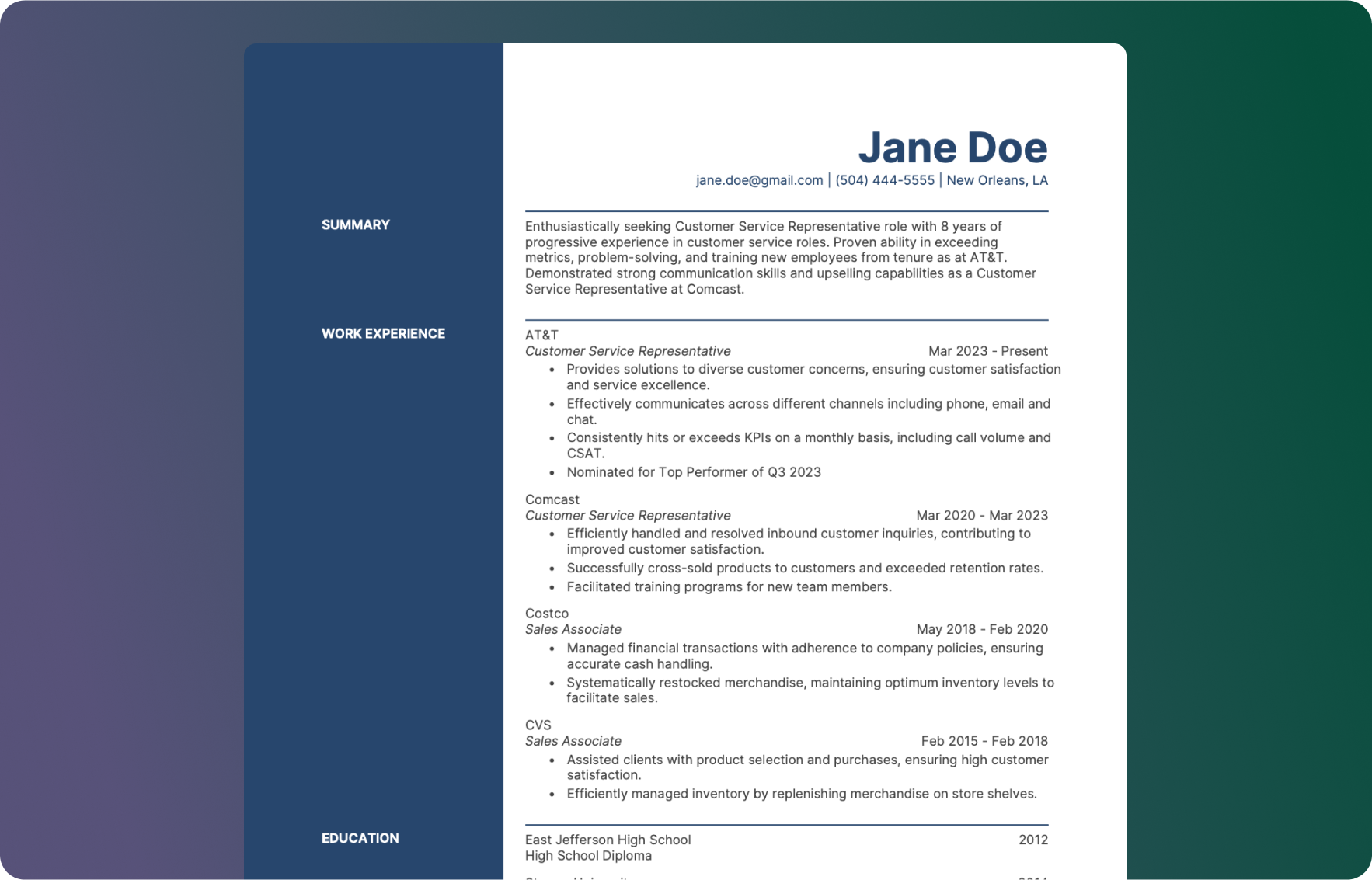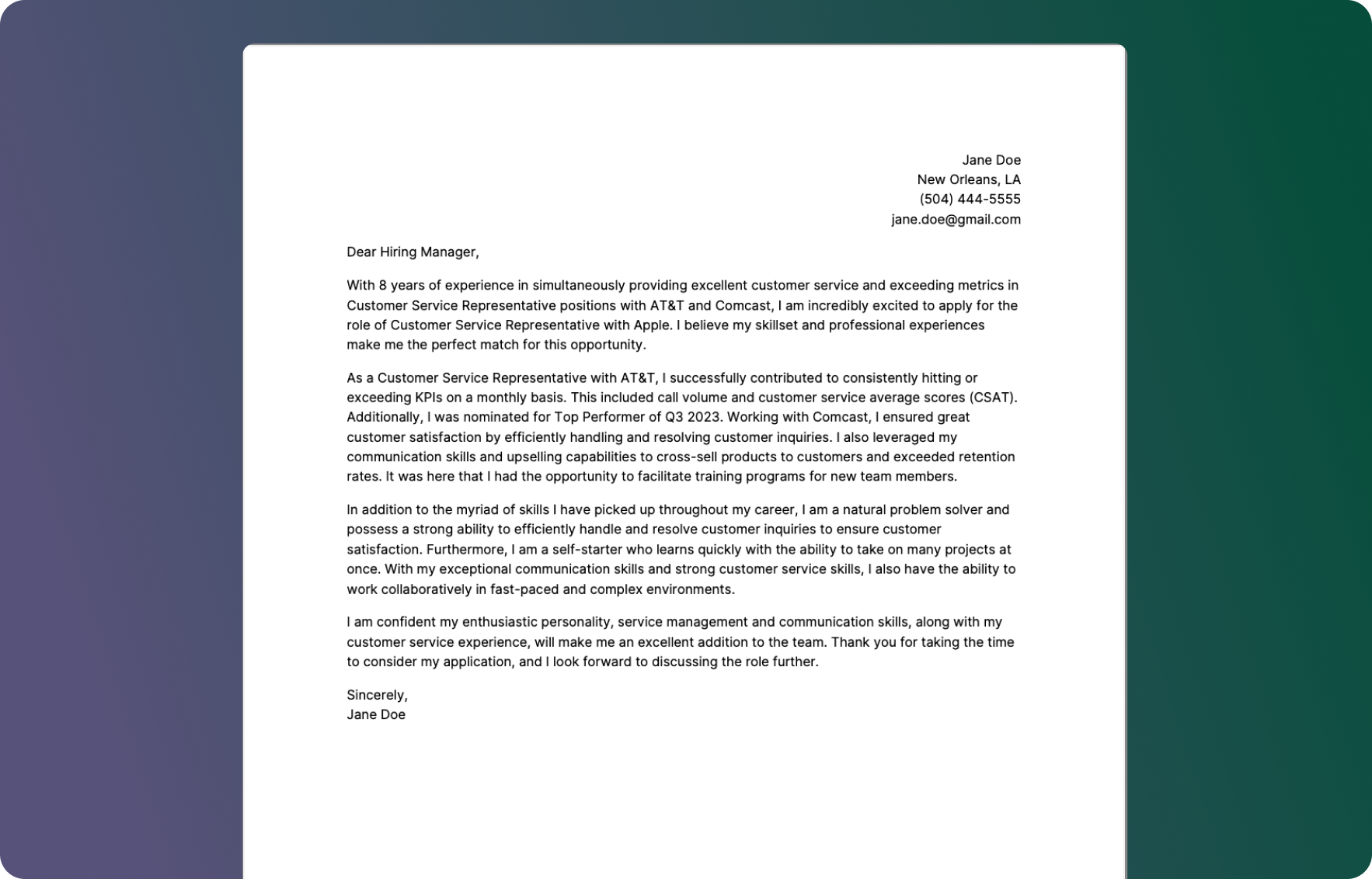What is a Customer Service Representative?
A Customer Service Representative (CSR) serves as the primary point of contact between a company and its customers, handling tasks like answering inquiries, resolving issues, and processing orders. Customer Service Reps communicate through various channels such as phone, email, and chat to provide assistance and information. The role requires strong communication skills, problem-solving abilities, and technical proficiency to manage customer records using specialized software. CSRs often work in call centers, retail environments, or remotely, and may operate on shifts to cover various time zones.
What are the skills and attributes that companies are looking for in customer service representatives?
- The following skills are generally considered important for success in a customer service role, although specific requirements may vary depending on the industry and company.
- Communication Skills: The ability to convey information clearly and effectively through both verbal and written means is crucial for interacting with customers.
- Empathy: Understanding and sharing the emotions of customers is essential, especially when dealing with complaints or problems.
- Problem-Solving Abilities: CSRs often face a range of issues and must be able to quickly assess a situation and find effective solutions.
- Technical Proficiency: Familiarity with Customer Relationship Management (CRM) software, databases, and basic computer functions is often needed to keep records and manage customer interactions.
- Attention to Detail: Accurate record-keeping, following procedures, and listening carefully to customer needs requires a keen attention to detail.
- Multi-Tasking: The ability to handle multiple tasks or channels (like phone, email, and chat) simultaneously is often essential, particularly in busy environments.
- Time Management: Efficiently prioritizing and managing time is crucial to ensure that all customer queries and issues are addressed in a timely manner.
Example Customer Service Representative Resume
💡 Protip: Use the EarnBetter Resume Generator to build the perfect Customer Service Representative Resume
What keywords are most important to include in your application for a customer service representative position?
- When applying for a Customer Service Representative (CSR) position, it’s essential to include keywords that highlight your relevant skills, experiences, and qualifications. This not only catches the eye of hiring managers but can also make your application more visible in automated tracking systems (ATS). Here are some important keywords to incorporate, if applicable:
- Customer Service
- Communication Skills
- Problem-Solving
- Technical Proficiency in software like CRM systems, databases, and other computer applications commonly used in customer service settings.
- Empathy
- Multi-Tasking
- Attention to Detail
- Team Player Adaptability
- Time Management
- Conflict Resolution
- Customer Retention
Example Customer Service Representative Cover Letter
💡 Protip: Use the EarnBetter Cover Letter Generator to build the perfect Customer Service Representative Cover Letter
What types of questions could I expect for a customer service representative interview?
When interviewing for a Customer Service Representative (CSR) role, you can expect a mix of general, behavioral, and role-specific questions aimed at assessing your skills, experience, and suitability for the position. Here are some common interview questions you might encounter:
- Question: Tell me about yourself.
- Guidance: Use the opportunity to introduce yourself succinctly, focusing on experiences and skills relevant to a customer service role.
- Sample Answer: "I have a background in retail and hospitality, where I’ve honed my customer service skills over the past three years. I’m passionate about helping people and resolving problems, which led me to pursue a career in this field. I am comfortable using CRM software and thrive in team environments."
- Question: Why do you want to work for this company?
- Guidance: Research the company beforehand and align your answer with the company’s values, mission, or specific aspects that genuinely interest you.
- Sample Answer: "I am impressed by your company’s reputation for customer satisfaction and your focus on delivering quality products. I believe that aligns well with my own values and experiences in striving for customer excellence."
- Question: Describe a time when you had to deal with an angry or dissatisfied customer. How did you handle it?
- Guidance: Use the STAR method (Situation, Task, Action, Result) to outline the scenario, your role, what you did, and the outcome.
- Sample Answer: "I once dealt with a customer who was upset about receiving a damaged product. (Situation & Task) I empathized with them and assured them we’d resolve the issue. (Action) I arranged for an immediate replacement and expedited shipping. The customer was pleased and continued to be a loyal customer. (Result)"
- Question: How do you handle stressful situations or high call volumes?
- Guidance: Discuss your stress management techniques and how you prioritize tasks, perhaps mentioning any relevant experience where these skills were crucial.
- Sample Answer: "When the call volume is high, I keep calm and prioritize tasks. I use any available brief moments to organize my workspace and review pending issues. My focus is on delivering quality service to each customer, rather than rushing through calls."
- Question: What techniques do you use to handle difficult or irate customers?
- Guidance: Discuss your problem-solving skills, your ability to remain calm, and your strategy for de-escalating situations.
- Sample Answer: "Firstly, I listen actively to what the customer is saying without interrupting. This often helps in calming them down as they feel heard. I then empathize with their situation and assure them that I will help to resolve the issue. I focus on what can be done, rather than dwelling on what can&rsquot be changed."
- Question: How do you define good customer service?
- Guidance: Speak from your experience and beliefs, but also align your answer with the company’s stated mission or goals related to customer service.
- Sample Answer: "To me, good customer service means meeting the needs of our clients and customers efficiently, in a friendly manner. It&rsquos about treating customers with respect, listening to their concerns, and resolving them in a way that leaves them satisfied and loyal to the brand."
What is the average day in the life of a customer service representative?
The average day for a Customer Service Representative (CSR) can vary depending on the industry and specific job setting, such as a call center, retail store, or remote workspace. However, here’s a general overview of what a day might look like for a CSR who is working in a call center or remotely:
The day of a Customer Service Rep usually starts by logging into various systems, including email and Customer Relationship Management (CRM) software. This is often followed by a quick team meeting to discuss daily priorities and updates. Throughout the day, the CSR juggles multiple responsibilities, such as answering phone calls, responding to emails, and handling live chat inquiries from customers. These interactions could range from resolving issues and answering questions to assisting with orders and returns. Amidst this, the CSR meticulously updates customer records in the CRM and may collaborate with other departments like billing, shipping, or technical support to fully resolve customer issues. Multi-tasking is a constant, as CSRs often manage several communication channels simultaneously. Time management becomes crucial, especially when they have to prioritize urgent cases or escalate issues to higher management. In the afternoon, follow-up calls and administrative tasks like reporting take precedence. As the shift comes to an end, the CSR ensures all pending queries are tagged for follow-up and may provide a handover or an end-of-day report to summarize activities and performance metrics. All in all, it’s a busy, multifaceted role that requires keen attention to detail, strong communication skills, and a problem-solving mindset.
What is the difference between a “customer service representative” (CSR) and a “customer success manager” (CSM)?
A customer service representative (CSR) and a customer success manager (CSM) both play crucial roles in interfacing with customers, but they have distinct focuses and responsibilities. A customer service representative (CSR) is primarily reactive in nature. They are the front line of support, answering queries, resolving problems, and handling complaints that customers present. Their main goal is to provide timely assistance and ensure that any immediate issues or concerns are addressed, leading to customer satisfaction in that moment. They work in the present, addressing day-to-day tasks that revolve around customer interactions, often following a set of guidelines or scripts.
In contrast, a customer success manager (CSM) takes a more proactive role. Their primary goal is to ensure that customers achieve their desired outcomes while using the product or service. CSMs work to understand the customer’s objectives, providing guidance and resources to help them succeed over the long term. Their role is relationship-based, aiming to foster deep connections and ensure the customer’s prolonged engagement and growth with the product or service. They strategize, focusing on customer onboarding, training, and adoption, aiming to reduce churn and increase customer loyalty and upselling opportunities.
In essence, while both CSRs and CSMs aim to ensure positive customer experiences, a CSR focuses on resolving immediate issues and concerns, whereas a CSM works on building and nurturing long-term relationships, ensuring customers derive continuous value from a product or service.
What should I do if I want to become a Customer Service Representative but don’t have much experience?
Venturing into a role as a Customer Service Representative (CSR) without substantial prior experience is attainable with the right strategies. First and foremost, hone your communication skills, both written and verbal, as they are the cornerstone of any customer service role. Familiarize yourself with common tools and platforms used in the industry, such as customer relationship management (CRM) software. Online courses or tutorials can be helpful in this regard. Next, focus on cultivating soft skills essential for the role: empathy, patience, and active listening. Handling customers requires a combination of understanding their issues and showcasing genuine concern. To gain practical experience, consider seeking internships, temporary positions, or even volunteering in roles that involve direct interaction with people, such as at events or community services. This hands-on interaction can equip you with the foundational skills of addressing queries and managing various personalities. Joining workshops or seminars on customer service can also provide valuable insights and networking opportunities. As you apply for CSR roles, highlight any relevant experience, even if it’s not directly tied to customer service, emphasizing your people skills and problem-solving abilities. Remember, while technical skills are teachable, the right attitude and a genuine desire to help others are intrinsic and can set you apart in the customer service domain.

